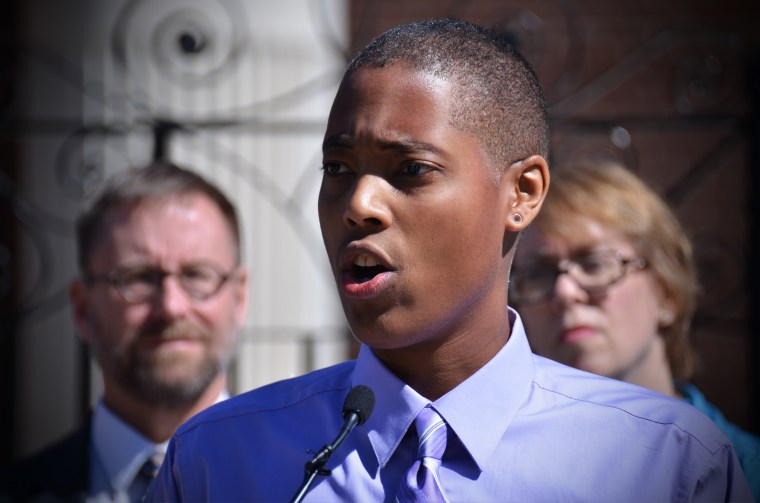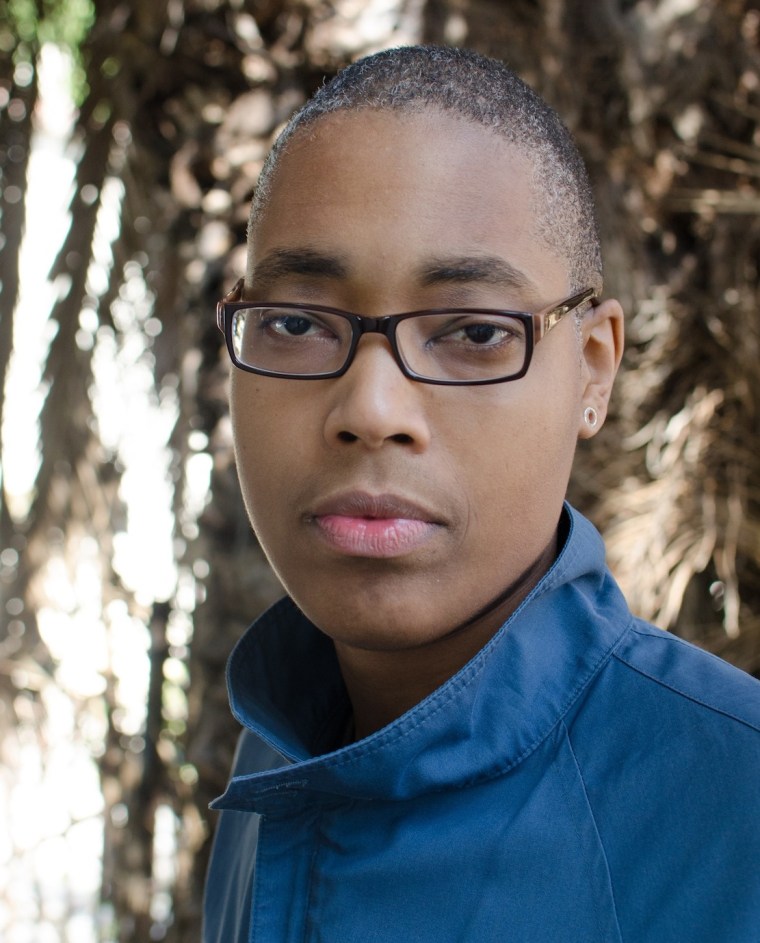Activist Sean Saifa Wall is an unapologetic Black voice in the intersex community. The 38-year-old was born with androgen insensitivity syndrome (AIS), one of a variety of intersex conditions in which a person is not distinctively male or female. He said his activism is fueled by anger and love.

“Anger at what was done to my body without my thorough informed consent, and love for what remains of my body and to protect a future generation from those violations,” he told NBC OUT.
The advocate speaks out against surgeries on intersex children, commonly performed to remove their reproductive organs or alter their genitalia to make them look more distinctively male or female. It’s something Wall has experienced first hand.
When he was born, doctors told his mother to raise him as a girl, a protocol at the time for babies born with AIS, he said. He would later, however, identify as a man. Wall has male chromosomes (XY), but his intersex condition — which makes his body only partially sensitive to testosterone — caused his genitalia to be sexually ambiguous, and his testes (what doctors referred to as his “gonads”) to grow internally. Doctors told him and his mother that he had “testicular feminization syndrome,” but the full extent of his intersex condition was not explained to Wall at the time, who continued to be told that he was a girl. When he turned 13, things took a surprising turn.
“I was developing masculine features and characteristics. I was getting facial hair, my voice was definitely deeper, and I was okay with it. I was trying to understand what was going on,” he said. He also developed a deep pain in his groin. Doctors said his internal gonads were causing his pain and surgically removed them. They put him on estrogen treatments, so he would develop as a woman. But even though he was always told he was a girl, it didn’t feel right to him.
“For me, the place where I get angry and where I get sad is that my testes were removed, and the doctors were not transparent. They were not transparent about the fact that I would be dependent on pharmaceutical hormones for the rest of my life. They weren’t transparent or clear about the fact that I may change gender,” Wall said.
“I draw a very distinct parallel between how the medical community has inflicted violence on intersex people by violating their bodily integrity, and how state violence violates the bodily integrity of Black people."
Wall was also dealing with a family tragedy at the time. When he was just 10, his father was sent to prison. He said his father’s incarceration introduced him to what he described as “the impact of state violence on Black people.”
“I draw a very distinct parallel between how the medical community has inflicted violence on intersex people by violating their bodily integrity, and how state violence violates the bodily integrity of Black people,” he said.
Wall, who grew up in the Bronx, said he was with his father during his last moments as a free man. It was 1989. Wall was excited to rent a new video game after school. He asked his father to take him to a rental store down the street. As they walked hand-in-hand, he said two plain-clothes police officers approached and arrested his father, who was wanted for assault.
“I was holding his hand, and they literally snatched him from me,” Wall said. “That was the last time I saw him alive, and that memory is seared in my mind.”
Wall said his father, who was HIV-positive and suffered from addiction and mental health problems, “just became a number in prison.”
“My father wasn’t a saint. I think he was a very complicated person. His love for me was complicated, as well,” Wall said. His father wrote love letters to his family every day he was in prison. He died after four years behind bars, Wall said.
“I think I’m a survivor of medicalized violence. I think I’m a survivor of state violence, because my dad went to prison,” he said.

While Wall was dealing with the trauma of his father’s death, he was also dealing with a sense of dysphoria over her gender identity. “Woman” just wasn’t an identity that felt right to him. Years later, when he was in college, he looked up “testicular feminization syndrome” online and began learning about AIS, which he didn’t even know he had. He realized the “gonads” described in his medical records were actually male testes.
“I really just started to put things together,” said Wall. “All of my visits to the doctor, what happened when I was 13, all of it started coming together to make sense. And I think that’s when I was just really overwhelmed. I felt feelings of shame. I felt like a freak, but I also felt betrayed because I was like, ‘Why didn’t anyone tell me this?’”
Wall is angry that his testes were removed. He said that even though they caused him pain at the time, doctors should have done more exploratory research before removing them.
“I think that decision about my body was taken away from me,” he explained.
Wall identified as a butch lesbian until he was 25. Not able to picture himself growing old as a woman, he started hormone therapy to transition to male.
“I thought I was going to have those lamb chops, you know, those thick sideburns,” he said. But because Wall’s body is only partially sensitive to testosterone, it didn’t have quite that effect. He still takes testosterone but doesn’t feel like “man” is an identity that quite fits him.
“I feel like for me, my journey — who I am as an intersex person — that fits. That tells the whole story,” he said.
A former president of Interact Advocates for Intersex Youth, Wall is a professional speaker and researcher living in Atlanta, Georgia. He’s outspoken on Black social justice issues, and wants to make sure the voices of Black people in the intersex community are heard.
“My desire for intersex liberation is totally intwined with Black liberation. They cannot be teased apart,” Wall concluded.
OutFront is a weekly NBC OUT series profiling LGBTQ people who are making a positive difference in the community.
